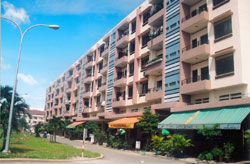
The Government plans to both encourage and compel companies that employ a large number of migrant workers to build low-cost houses for them, says Construction Minister Trinh Dinh Dung.
 |
| Apartment for workers at Tan Binh Industrial Zone in HCM City. The Government has called on property developers to build more low-cost housing for workers. |
Dung told a meeting in southern Binh Duong Province on Monday that initially, major State-owned companies would have the obligation of building houses for workers.
In the private sector, sanctions would be applied to real estate companies that did not spread their investment for building accommodation for workers and low-income people, he said.
The Government has been forced to consider these measures by the housing pressure created by the rapidly increasing number of workers throughout the country, especially in export processing zones (EPZs) and industrial parks (IPs).
Despite the implementation of the Government's Decree 66/2009/QD-TTg on developing accommodation for workers at EPZs and IPs, the situation has not improved much over the last two years because demand is much higher than supply.
There are 260 industrial zones nation-wide, of which 174 of them are operational, according to the Ministry of Planning and Investment's Department for Economic Zones Management.
More than 80 per cent of workers in those industrial zones have to rent low-quality accommodation and paying VND1.5-2 million (US$73-97) a month, about two thirds of their monthly salary.
About 1.6 million people currently work in EPZs and IPs and only 20 per cent of these have stable accommodation, Dung said at the meeting, adding that millions more were working at enterprises, production establishments and independent industrial zones.
The ministry estimates that by 2015, 2.65 million workers in EPZs and IPs will be in need of housing.
Dong Nai and Binh Duong, both neighbouring HCM City, are the two southern provinces with the highest number of industrial zones as well as migrant workers.
With 30 EPZs and IPs, Dong Nai has almost 400,000 workers and 60 per cent of them are migrants. Binh Duong has 28 industrial zones employing 740,000 workers, of which nearly 85 per cent are migrants.
A recent survey by the Binh Duong Federation of Labour found 97 per cent of the migrant workers needed housing. The province plans to meet the housing demand of half of the needy residents by 2015.
The main reason for the large number of workers not being able to find accommodation was that companies that employed them did not pay much attention to this aspect, while real estate companies had been giving their priority to upscale housing that earned them the highest profits, Dung said.
He said that if employers were to provide accommodation for their workers, it would boost their competitiveness and ensure efficient production.
Policy support
Workers' housing projects in Dong Nai have not attracted investment because companies cannot access preferential credit and other policies that benefit them, according to the provincial Department of Construction.
Two years since the Government issued Decree 66, 110 housing projects for workers have been registered for the 2010-15 period, but work has begun on just 25, said Vu Hong Quang, deputy head of the Viet Nam General Confederation of Labour's policy and law department.
Quang said implementation of the decree has run into several difficulties including the lack of land and policies that would attract investors.
HCM City, the country's commercial hub, has also been seeing a rapid increase in housing needs for workers but "the supply is far behind demand," Nguyen Van Danh, deputy director of the city's Construction Department, said at the meeting.
There are 13 IPs in HCM City and about 75 per cent of their 258,700 workers are migrants. This brings the total number of workers in the city to 1.9 million, of whom more than 1.3 million are migrants from other localities. About half of the migrant workers are in need of accommodation.
Danh said investment in housing projects for workers has not been effective so far because companies, households and individuals who have been doing this business outside EPZs and IPs cannot access favourable tax, credit and infrastructure development policies.
The HCM City official suggested that the Government supports households and individuals with loans to build housing for workers. A maximum of 70 per cent of the total investment for contracts of five to seven years could be offered as loans, he said.
The labour confederation also urged the Government to introduce policies to support companies willing to take on workers' housing projects, including favourable loans, land lease agreements and tax breaks.
The Ministry of Construction has said it will make real estate companies responsible for building social houses, like what has been done in some other countries.
(Source: VNS)



